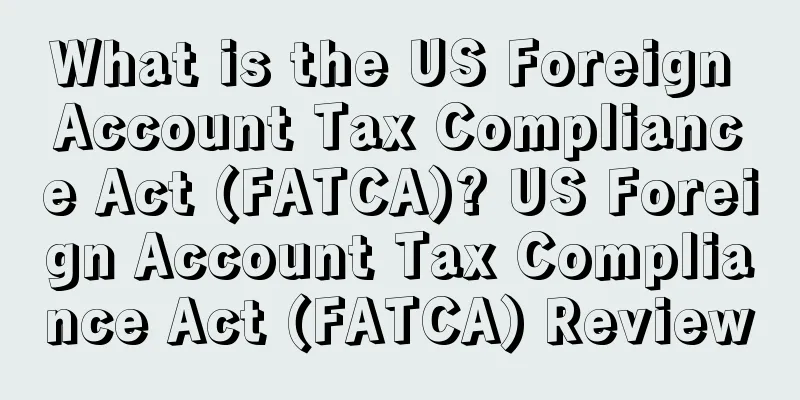What is the US Foreign Account Tax Compliance Act (FATCA)? US Foreign Account Tax Compliance Act (FATCA) Review

|
The Foreign Account Tax Compliance Act (FATCA), also known as the "FATCA clause", is a federal law passed by the United States in 2010. The law requires all non-US foreign financial institutions to search for records of US citizens' financial activities in the institution and report the assets and identities of these people to the US Treasury Department . The Foreign Account Tax Compliance Act (FATCA) is a 2010 federal law in the United States. Foreign financial institutions (FFIs) search their records for clients with ties to the United States, including records of birth or prior residence in the United States, or similar indications, and report the assets and identities of those persons to the U.S. Treasury. FATCA also requires those persons to report their non-U.S. financial assets annually on Form 8938 to the Internal Revenue Service (IRS), which is an older, further redundant requirement to file Form 114 (also known as the “FBAR”) annually with the Financial Crimes Enforcement Network (FinCEN). Like U.S. income tax law, FATCA applies to U.S. residents, as well as U.S. citizens and green card holders living in other countries. FATCA is the revenue-raising portion of the 2010 U.S. jobs stimulus bill, the Hiring Incentives to Restore Jobs Act (HIRE), enacted as Subtitle A of Title V of the Act (sections 501 to 541). According to the IRS, “FFIs that have entered into an agreement with the IRS to report their account holders may be required to withhold 30% of payments to foreign recipients when certain payments do not comply with FATCA.” The United States itself has not yet complied with FATCA because, as of 2017, it has not provided promised reciprocity to partner countries and has not signed up to the Common Reporting Standard (CRS). FATCA has also been criticized for its impact on Americans abroad and has involved a record number of U.S. citizen waivers in the 2010s and 2020s. Bills to repeal FATCA have been introduced in both the U.S. Senate and the House of Representatives. Regulation FATCA has the following important provisions:
A foreign financial institution that is itself the beneficial owner of such payments is not entitled to a credit or refund for the withheld taxes in the absence of treaty override. U.S. persons are identified by a “FATCA badge.” Bank officials who know the identity of a U.S. person by other means are also required to determine the identity of that person for FATCA purposes. Once identified, the FFI is responsible for further questioning of the individual as required by law.
In other words, all FFI account holders are subject to FATCA reporting requirements. U.S. persons who own or have authority over these foreign accounts or assets must report them on a new IRS Form 8938, Statement of Specified Foreign Financial Assets, which is filed with the person's U.S. tax return if the value of these accounts is generally more than U.S. $50,000. The higher reporting threshold applies to U.S. persons who are residents abroad and file jointly. Account holders who underreport income in[clarification needed] undisclosed foreign financial assets are subject to a 40% penalty. The statute of limitations is extended to six years for underreporting gross income by more than 25%. It also requires taxpayers to report financial assets in noncustodial accounts, i.e., physical stock or bond certificates.
The reporting requirement is in addition to the requirement for all U.S. persons to report non-U.S. financial accounts to the U.S. Financial Crimes Enforcement Network (FinCEN). This includes, in particular, Form 114, Report of Foreign Bank and Financial Accounts (FBAR), for foreign financial accounts exceeding $10,000, issued under the Bank Secrecy Act by FinCEN. Logo Banks performing functions under FATCA legislation will conduct searches based on FATCA markers, which include:
References |
<<: What is Anti-Tax Avoidance? Anti-Tax Avoidance Review
>>: What is the Common Reporting Standard? Common Reporting Standard Assessment
Recommend
What is ProfitSourcery? ProfitSourcery Review
ProfitSourcery is an online product selection tool...
Anker earned 3 billion in Q3. Is high shipping cost a stumbling block to net profit growth?
Time flies and in the blink of an eye, it is alrea...
How to form Amazon related sales and common related sales methods
"Related sales" seems to be something t...
How to modify the Amazon brand name?
A brand is a name that represents a product or a ...
More than 250,000 children's speakers have been recalled! Available at Amazon and Target
It is learned that recently, the U.S. Consumer Pro...
What is DealsPlus? DealsPlus Review
DealsPlus is a discount deal and coupon informatio...
Baby gates sold on eBay and other platforms are recalled by CPSC! Violation of federal safety regulations
It is learned that on October 31, the U.S. Consume...
What is WhatsApp Pay? WhatsApp Pay Review
WhatsApp Pay is a UPI-based payment service launch...
Good news! Amazon waives some long-term storage fees!
As the global epidemic spreads, the number of conf...
What is Long Tail Pro? Long Tail Pro Review
Long Tail Pro is a powerful keyword research softw...
Another US trademark scandal! Tens of thousands of trademarks are involved again!
This is the latest news, not old news. So be sure ...
Amazon sellers, please take note: Don’t just focus on selling products, product safety is a big deal
Amazon's product safety issues have always bee...
What is Amazon Affiliate? Amazon Affiliate Review
Amazon Affiliate is a very special sales model of ...
What is Wansu Logistics? Wansu Logistics Review
Shenzhen Wansu Logistics Co., Ltd. was established...
Amazon is targeted by the US FTC! Antitrust investigation is about to be accelerated
Recently, the US FTC sent antitrust professor and ...









